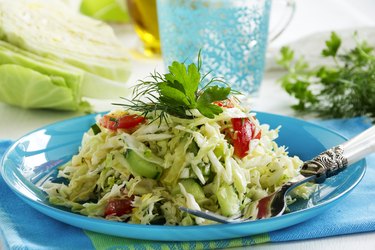
The Cabbage Soup Diet is a weight-loss diet designed to promote rapid weight loss. Though numerous variations of the Cabbage Soup Diet exist, they all promote one primary guideline -- eating as much cabbage soup as you desire. The soup usually contains onions, bell peppers, tomatoes, celery, cabbage and bouillon cubes, salt, pepper and other seasonings. According to the American Heart Association, the Cabbage Soup Diet is ineffective and poses numerous adverse side effects.
Gas, Abdominal Pain and Bloating
Video of the Day
Cabbage, like other cruciferous vegetables, is known to cause gas, bloating and associated abdominal pain when consumed in excess. People particularly prone to gas may experience these symptoms from even small amounts of cabbage. For this reason, it is no surprise that gas, bloating and abdominal pain are common reported side effects of the Cabbage Soup Diet. Symptoms vary in severity and frequency, depending upon how much cabbage soup you consume and your sensitivity to gas-causing substances in cabbage. However, the more cabbage soup you consume during the diet, the greater your becomes of experiencing these symptoms.
Video of the Day
Exhaustion, Hunger and Fatigue
The Cabbage Soup Diet encourages severe calorie reduction and provides no fat or protein. According to "The New Cabbage Soup Diet," by Margaret Danbrot, the diet bases itself on low-calorie and negative-calorie foods -- foods your body uses more calories to eat than are contained in the foods. Danbrot says that even a modest alteration to the Cabbage Soup Diet, such as exchanging a fruit for a vegetable, can contribute modest amounts of calories that may make a difference in weight loss. This emphasis on eating as few calories as possible while attempting to avoid hunger by consuming soup is not scientifically or nutritionally valid, but it is potentially dangerous. Without appropriate calories for fuel, you may experience intense hunger and tiredness and feel less able to tend to usual work, school and home activities. Fat and protein provide numerous benefits, including improved energy, satiation and food enjoyment. Fat is also necessary for the absorption of certain nutrients and protein contributes to muscle strength. Without fat and protein, your chance of experiencing exhaustion, hunger and fatigue are heightened.
Heart and Electrolyte Problems
One of the dangers of extremely low-calorie diets, such as the Cabbage Soup Diet, involves the heart. According to the Weight-control Information Network, consuming fewer than 800 calories per day is associated with irregular heart rhythms, which can become fatal. An irregular heartbeat is particularly dangerous if you have a history of heart disease. Low-calorie diets are often deficient in hydrating foods, such as proper amounts of fruits and vegetables. In addition, consuming soup throughout the day may reduce your interest in drinking water. For these reasons, the Cabbage Soup Diet may also lead to dehydration. Dehydration can cause numerous symptoms, including tiredness, weakness and dizziness. If left untreated, dehydration may lead to electrolyte imbalances -- improper levels of bodily salts that help regulate your heartbeat, muscle contraction and other important functions. In severe cases, electrolyte imbalances cause fainting, difficulty breathing and death.
Emotional Effects
The Cabbage Soup Diet may also adversely effect your emotional wellness. Restriction from normal meals and snacks can cause feelings of deprivation. According to the National Eating Disorders Association, dieting is associated with poor self-esteem and body image, anxiety, depression and increased risk for mental illnesses, such as anorexia, bulimia and binge eating disorder.
Weight Gain
The effectiveness of the Cabbage Soup Diet lacks evidence. In fact, most dieters are disappointed when, after the diet, their lost weight returns quickly as they begin eating normal foods. Restrictive dieting can also reduce your metabolism and lead to increased weight gain later on. According to the National Eating Disorders Association, most diets fail to provide long-term weight loss success. Dieting also increases your risk of developing binge-eating behaviors, which may also lead to weight gain.